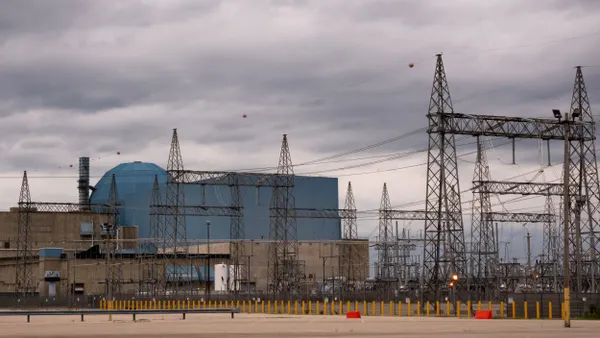FirstEnergy has received a subpoena from the Ohio Organized Crime Investigations Commission related to the company’s bribery scandal, Brian Tierney, the company's new president and CEO said Wednesday during an earnings conference call.
The commission’s investigation appears to cover issues fleshed out in a deferred prosecution agreement, or DPA, entered into in July 2021 between FirstEnergy and the U.S. Attorney’s Office for the Southern district of Ohio, according to Tierney.
Under the agreement, FirstEnergy paid a $230 million penalty for bribing Ohio lawmakers to ensure the passage of a ratepayer-funded bailout for nuclear and coal-fired power plants.
“FirstEnergy is cooperating with the investigation,” the company said in its quarterly Securities and Exchange Commission filing. “No contingency has been reflected in FirstEnergy’s consolidated financial statements, as a loss is neither probable, nor is a loss or range of loss reasonably estimable,” the Akron, Ohio-based utility company said.
FirstEnergy has taken responsibility for its role in the scandal and the company doesn’t expect the investigation will derail the progress it has made in “putting the activities of the past few years in the rear-view mirror,” Tierney said. “We don't think it will impact the DPA in any way.”
Since joining FirstEnergy on June 1, Tierney has met with members of utility commissions in New Jersey, Ohio and West Virginia, and two governors, he said.
“Each of the commissions I spoke with want FirstEnergy to keep up with the normal day-to-day business of investing in our utilities and serving our customers,” he said. “I have not detected any regulatory overhang associated with the past that would impact our forward-facing activities before the commissions.”
FirstEnergy utilities have pending base rates cases in New Jersey, Maryland and West Virginia. The company expects to file one in Pennsylvania early next year and in Ohio in May.
The actual returns on equity for FirstEnergy’s utilities lag what they are allowed to earn. Actual ROEs range from 4% in Maryland to 8.9% in Pennsylvania, according to a company presentation.
Through the rate cases, the utilities aim to have authorized ROEs “that are more consistent with what you're seeing across the industry rather than the lower ROEs that we're currently earning,” Tierney said.
Hearings begin next week to consider FirstEnergy’s application to consolidate its four Pennsylvania utilities: Metropolitan Edison, Pennsylvania Electric, Pennsylvania Power and West Penn Power, according to Jon Taylor, FirstEnergy chief financial officer.
“This is an important step to align with our state operating model, simplify our legal entity structure, and increase the flexibility and efficiency of our financing strategy,” he said. FirstEnergy aims to merge the utilities early next year. It also plans to merge its Ohio utilities.
Meanwhile, FirstEnergy’s second-quarter income jumped to $235 million, or 41 cents/share, up from $187 million, or 33 cents/share, a year ago. Revenue grew to $3 billion from $2.8 billion.
However, operating earnings, which exclude certain one-time items, fell 11% to 47 cents/share from 53 cents/share, partly because of reduced power sales caused by mild weather, according to the company.
FirstEnergy electricity sales fell 4.9% in the second quarter to 32.9 million MWh compared to the year-ago quarter.
Weather-adjusted sales, a measure that aims to eliminate the variability of weather, were down only 1.1%, with the commercial sector leading the slide in sales, FirstEnergy said.
FirstEnergy Q2 weather-adjusted sales fall 1.1%
Revenue from C&I customer classes is not as sensitive to sales volumes because of their rate design, which is typically based on peak use, Taylor said.















